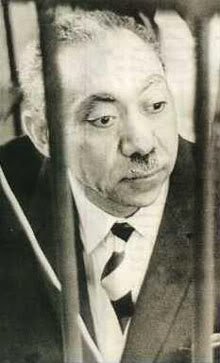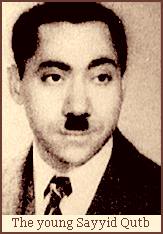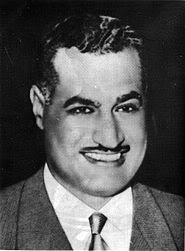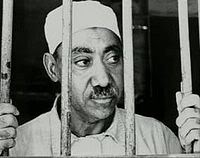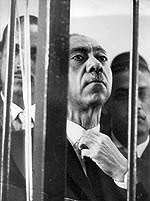- Qatada -
Spread this Avatar!
- Messages
- 11,349
- Reaction score
- 2,693
- Gender
- Male
- Religion
- Islam
[FONT="]Asalam alaikum warahmatulah wabarakatuh[/FONT]
[FONT="]The Lives of Hasan al Banna & Syed Qutb
Download PDF version[/FONT][FONT="]
[/FONT]
[FONT="]The Lives of Hasan al Banna & Syed Qutb
Download PDF version[/FONT][FONT="]
[/FONT]
[FONT="]Who was Hasan al Banna?[/FONT]
[FONT="]حسن البنا[/FONT][FONT="][/FONT], October 14, 1906 – February 12, 1949

[FONT="]
[/FONT] [FONT="]His Islamic Upbringing
[/FONT] [FONT="]The Muslim Brotherhood (Ikhwan al Muslimeen) was founded by Hasan al-Banna (1906-1949) in the Egyptian town of al- Isma'iliyyah in 1928. The son of an Azharite scholar, who earned his livelihood by repairing watches, Hasan al-Banna showed from his early school-days an inclination and great zeal for calling people to Islamic values and traditions. His strong sense of religiosity and spiritual awareness drove him to join the Hasafiyyah tariqah, one of many Sufi tariqahs that were widespread in Egypt at that time. Even though he was not formally associated with this tariqah after he founded the Ikhwan, he, nevertheless, maintained a good relation with it, as indeed with other Islamic organizations and religious personalities, and persisted in reciting the litanies (awrad, pl. of wird) of this tariqah until his last days. Though Hasan al-Banna joined a modern-type school of education, he promised his father that he would continue to memorize the Qur'an, which he did, in fact later, at the age of twelve. While at school, he took part in the activities of some religious associations and clubs which were promoting it [/FONT][FONT="]and calling for the observance of Islamic teachings. He also formed, while still at school, an association for the enjoining of good and forbidding of evil. After finishing school, Hasan al-Banna joined Dar alMu'allimin [house of Teachers] in Damanhur, in 1920, and then went to Dar al- 'Ulum in 1923 where he graduated in 1927 as a primary school teacher.
[/FONT] [FONT="]Hasan the Spokesman:[/FONT]
[FONT="]He was then assigned to a teaching post in al-Isma'iliyyah. Hasan al-Banna developed the habit of delivering speeches and organizing study circles in the Mosque near his residence. He used to convey to the people his deep sense of disenchantment with the state of the Muslim ummah, and the failure of the religious authorities, in particular al-Azhar University, to redress the status quo. He also expressed doubts about the prevailing political system, and the betrayal by most politicians of the values and principles of the Muslim nation. A group of young workers, who used to attend these speeches and study circles, were so impressed by his comprehensive approach to Islam, his diagnosis of the ills of Muslim society and the cures which he suggested, that they convinced him to form an organization which would take as its mission the revival of Islam. It was a humble beginning, but the speed with which the group grew in the span of just a few years reflected the centuries of Muslims' discontent vis-a-vis what was taking place in their society.
[/FONT] [FONT="]The Origins of the Ikhwan al Muslimeen
[/FONT] [FONT="]The formation of the Ikhwan al Muslimeen [Muslim brotherhood] took place four years after the abolition of the Ottoman Caliphate, the last symbol of Muslim strength and dignity. However, the signs of decay and degeneration of Egyptian society appeared centuries before, with Muhammad 'Ali Pasha's reforms, even though the reign of the latter and the subsequent deviations which came with it, were only logical ends to the deviations which preceded his reign. The formation of the Ikhwan was no ordinary event. Had it been so, it would not have stirred Egyptian society, and indeed those of many other Muslim countries, the way it did. There were, at the beginning of this century, and subsequently, scores of Islamic associations, organizations and groups. There existed also different political parties. But the emergence of the Ikhwan was an extraordinary event. For out of the ruins of weakness, ideological doubts, still worse perversion to everything Islamic, emerged a group that advocated Islam in its entirety, without apology or complacency.
[/FONT] [FONT="]This group was, as Hasan al-Banna pointed out in his Risalat aIMu'tamar al- Khamis (Epistle of the Fifth Congress)'
[/FONT]
[/FONT] [FONT="]But he did, in fact, turn all that he had in mind into a living reality. He surprised Egypt and the Muslim world with his leadership genius, though he was certainly more than a great leader. He left a lasting and positive mark on everyone he met. And this is perhaps why the Ikhwan gathered into its fold people with inclinations, interests and backgrounds which would have otherwise appeared impossible to reconcile. The other interesting characteristic about Hasan al-Banna is that he was wholeheartedly involved in what he was doing and he sacrificed everything for what he believed in.
[/FONT]
[FONT="]حسن البنا[/FONT][FONT="][/FONT], October 14, 1906 – February 12, 1949
[FONT="]
[/FONT] [FONT="]His Islamic Upbringing
[/FONT] [FONT="]The Muslim Brotherhood (Ikhwan al Muslimeen) was founded by Hasan al-Banna (1906-1949) in the Egyptian town of al- Isma'iliyyah in 1928. The son of an Azharite scholar, who earned his livelihood by repairing watches, Hasan al-Banna showed from his early school-days an inclination and great zeal for calling people to Islamic values and traditions. His strong sense of religiosity and spiritual awareness drove him to join the Hasafiyyah tariqah, one of many Sufi tariqahs that were widespread in Egypt at that time. Even though he was not formally associated with this tariqah after he founded the Ikhwan, he, nevertheless, maintained a good relation with it, as indeed with other Islamic organizations and religious personalities, and persisted in reciting the litanies (awrad, pl. of wird) of this tariqah until his last days. Though Hasan al-Banna joined a modern-type school of education, he promised his father that he would continue to memorize the Qur'an, which he did, in fact later, at the age of twelve. While at school, he took part in the activities of some religious associations and clubs which were promoting it [/FONT][FONT="]and calling for the observance of Islamic teachings. He also formed, while still at school, an association for the enjoining of good and forbidding of evil. After finishing school, Hasan al-Banna joined Dar alMu'allimin [house of Teachers] in Damanhur, in 1920, and then went to Dar al- 'Ulum in 1923 where he graduated in 1927 as a primary school teacher.
[/FONT] [FONT="]Hasan the Spokesman:[/FONT]
[FONT="]He was then assigned to a teaching post in al-Isma'iliyyah. Hasan al-Banna developed the habit of delivering speeches and organizing study circles in the Mosque near his residence. He used to convey to the people his deep sense of disenchantment with the state of the Muslim ummah, and the failure of the religious authorities, in particular al-Azhar University, to redress the status quo. He also expressed doubts about the prevailing political system, and the betrayal by most politicians of the values and principles of the Muslim nation. A group of young workers, who used to attend these speeches and study circles, were so impressed by his comprehensive approach to Islam, his diagnosis of the ills of Muslim society and the cures which he suggested, that they convinced him to form an organization which would take as its mission the revival of Islam. It was a humble beginning, but the speed with which the group grew in the span of just a few years reflected the centuries of Muslims' discontent vis-a-vis what was taking place in their society.
[/FONT] [FONT="]The Origins of the Ikhwan al Muslimeen
[/FONT] [FONT="]The formation of the Ikhwan al Muslimeen [Muslim brotherhood] took place four years after the abolition of the Ottoman Caliphate, the last symbol of Muslim strength and dignity. However, the signs of decay and degeneration of Egyptian society appeared centuries before, with Muhammad 'Ali Pasha's reforms, even though the reign of the latter and the subsequent deviations which came with it, were only logical ends to the deviations which preceded his reign. The formation of the Ikhwan was no ordinary event. Had it been so, it would not have stirred Egyptian society, and indeed those of many other Muslim countries, the way it did. There were, at the beginning of this century, and subsequently, scores of Islamic associations, organizations and groups. There existed also different political parties. But the emergence of the Ikhwan was an extraordinary event. For out of the ruins of weakness, ideological doubts, still worse perversion to everything Islamic, emerged a group that advocated Islam in its entirety, without apology or complacency.
[/FONT] [FONT="]This group was, as Hasan al-Banna pointed out in his Risalat aIMu'tamar al- Khamis (Epistle of the Fifth Congress)'
[/FONT]
[FONT="](1)[/FONT][FONT="] 'a salafi message: for it calls for returning Islam to its pure sources, i.e. The Book of God and the Sunnah of His Messenger;[/FONT]
[FONT="](2)[/FONT][FONT="] a Sunni path: for the Ikhwan oblige themselves to following the purified sunnah in all their deeds, especially in the domain of beliefs and acts of worship . .[/FONT]
[FONT="](3)[/FONT][FONT="] a Sufi reality: for the Ikhwan know that the basis of righteousness is the purification of the soul, transparency of the heart, perseverance in work . . . and love for the sake of God . . .;[/FONT]
[FONT="](4)[/FONT][FONT="] a political organization: for the Ikhwan demand the reform of political order from within and the revision of the relationship of the Muslim ummah with other nations ... as well as teaching people and train them to raise their heads in pride and dignity . . . ; [/FONT]
[FONT="](5) a sporting group: for the Ikhwan look after their bodies and know that a strong Muslim is better than a weak Muslim . . [/FONT]
[FONT="](6) a scientific and cultural league: for Islam makes the seeking of knowledge a religious duty . . ; [/FONT]
[FONT="](7) an economic enterprise: for Islam is interested in the acquiring of money and its use . . . ;[/FONT]
[FONT="](8) a social endeavour: for the Ikhwan are interested in the ills of society and try to find ways for their cure . .' This comprehensiveness which Hasan al-Banna had in mind could have passed for a mere theoretical, idealist manifesto similar to countless other manifestos and[/FONT][FONT="]declarations made by many organizations and religious or political personalities.[/FONT][FONT="][/FONT]
[FONT="][FONT="](2)[/FONT][FONT="] a Sunni path: for the Ikhwan oblige themselves to following the purified sunnah in all their deeds, especially in the domain of beliefs and acts of worship . .[/FONT]
[FONT="](3)[/FONT][FONT="] a Sufi reality: for the Ikhwan know that the basis of righteousness is the purification of the soul, transparency of the heart, perseverance in work . . . and love for the sake of God . . .;[/FONT]
[FONT="](4)[/FONT][FONT="] a political organization: for the Ikhwan demand the reform of political order from within and the revision of the relationship of the Muslim ummah with other nations ... as well as teaching people and train them to raise their heads in pride and dignity . . . ; [/FONT]
[FONT="](5) a sporting group: for the Ikhwan look after their bodies and know that a strong Muslim is better than a weak Muslim . . [/FONT]
[FONT="](6) a scientific and cultural league: for Islam makes the seeking of knowledge a religious duty . . ; [/FONT]
[FONT="](7) an economic enterprise: for Islam is interested in the acquiring of money and its use . . . ;[/FONT]
[FONT="](8) a social endeavour: for the Ikhwan are interested in the ills of society and try to find ways for their cure . .' This comprehensiveness which Hasan al-Banna had in mind could have passed for a mere theoretical, idealist manifesto similar to countless other manifestos and[/FONT][FONT="]declarations made by many organizations and religious or political personalities.[/FONT][FONT="][/FONT]
[/FONT] [FONT="]But he did, in fact, turn all that he had in mind into a living reality. He surprised Egypt and the Muslim world with his leadership genius, though he was certainly more than a great leader. He left a lasting and positive mark on everyone he met. And this is perhaps why the Ikhwan gathered into its fold people with inclinations, interests and backgrounds which would have otherwise appeared impossible to reconcile. The other interesting characteristic about Hasan al-Banna is that he was wholeheartedly involved in what he was doing and he sacrificed everything for what he believed in.
[/FONT]

